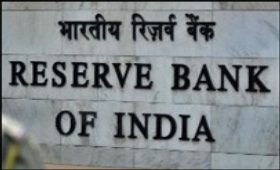|
|
|

|
RBI panel bats for large corporate-backed private banks
|
|

|
|
| Top Stories |
 |
|
|
|
SME Times News Bureau | 21 Nov, 2020
The Reserve Bank of India's internal working committee has recommended
path-breaking reforms in the Indian banking sector, calling for
participation of large Indian corporates and industrial house as
promoters of banks.
The P.K. Mohanty-headed working group was set
up in June to examine and review the extant licensing and regulatory
guidelines relating to ownership and control, and corporate structure of
Indian private sector banks.
"Large corporate/industrial houses
may be allowed as promoters of banks only after necessary amendments to
the Banking Regulations Act, 1949 to deal with connected lending and
exposures between the banks and other financial and non-financial group
entities; and strengthening of the supervisory mechanism for large
conglomerates, including consolidated supervision," the committee said
in its report released by the RBI on Friday.
The suggestion is in
line with evolving thinking that a liberal ownership structure, backed
by strong regulation, would help in expanding the banking services in
the country while getting the requisite investment from the corporate
sector.
The RBI had remained reluctant to permit large corporate
houses to promote banks as such a structure is seen to hamper free and
fair operations of the banks while presenting a case for conflict of
interest.
The NITI Aayog, on the other hand, had recently
recommended to the government that long-term private capital should be
allowed into the banking sector. It also suggested giving banking
licences to select industrial houses.
In its report, the working
group has also batted for conversion of well-run large non-banking
Finance Companies (NBFCs, with an asset size of Rs 50,000 crore and
above), including those which are owned by a corporate house, into
banks, provided they have completed 10 years of operations and meet the
due diligence criteria and satisfy other additional conditions.
With
regard to the complex ownership structure that is place for the banking
sector in India, the working group has recommended a more liberal
structure that allows promoters to hold higher shareholding in private
banks.
It has suggested that while the initial five year lock-in
period for promoter shareholding in banks with a minimum holding of 40
per cent per cent of the paid-up voting equity share capital may
continue, the cap on promoters' stake in long run of 15 years may be
raised from the current levels of 15 per cent to 26 per cent.
"This
stipulation (26 per cent shareholding) should be uniform for all types
of promoters and would mean that promoters, who have already diluted
their holdings to below 26 per cent, will be permitted to raise it to 26
per cent of the paid-up voting equity share capital of the bank. The
promoter, if he/she so desires, can choose to bring down holding to even
below 26 per cent, any time after the lock-in period of five years,"
the committee has said in its report.
As per current regulations, promoters of banks have to reduce their shareholding to 15 per cent level.
To
provide further flexibility to promoters of private banks, the
committee has said that no intermediate sub-targets between 5-15 years
may be required for reduction in shareholding.
"However, at the
time of issue of licences, the promoters may submit a dilution schedule
which may be examined and approved by the Reserve Bank. The progress in
achieving these agreed milestones must be periodically reported by the
banks and shall be monitored by the Reserve Bank," the committee said.
|
|
|
| |
|
|
|
|
|
|
|
|
|
|
|
|
|
|
| |
| Customs Exchange Rates |
| Currency |
Import |
Export |
US Dollar
|
₹91.2
|
₹89.5 |
UK Pound
|
₹123.35
|
₹119.35 |
Euro
|
₹107
|
₹103.35 |
| Japanese
Yen |
₹57.9 |
₹56.1 |
| As on 22 Jan, 2026 |
|
|
| Daily Poll |
 |
 |
| What is your primary "Make or Break" expectation from the Finance Minister this year? |
|
|
|
|
|
| Commented Stories |
 |
|
|
|
|
|
| |
|